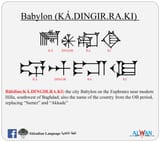>>513054776
>In 1894 BC, Amorite invaders conquered a group of Akkadians in the Babil Governorate, founding the city of Babylon - a Greek translation of the original Akkadian name of "Babilim" - the "Gate of the Gods". It is believed that the Amorites originated in the Jebel Bishri mountain range of Syria's Deir ez-Zor Governorate. The Neo-Sumerians viewed the "Martu" ("Westerners") with disgust and contempt:
>"The martu who know no grain...The martu who know no house nor town, the boors of the mountains...The martu who digs up truffles...who does not bend his knees to cultivate the land, who eats raw meat, who has no house during his lifetime, who is not buried after death."
>"They have prepared wheat and grain as a confection, but an Amorite will eat it without even recognizing what it contains!"
>It seems, however, that the Amorite barbarians had the last laugh - the Sumerians were eventually absorbed completely into the Akkadians, their language and identity disappearing forever, while the Amorites took power in southern Mesopotamia. Meanwhile, Assyria expanded into modern eastern Turkey and northeastern Syria
>During the 18th century BC, the king of Babylon ("Sakkanakki Babili"), Hammurabi/"Haammurabi" (whose Amorite birth name was "Ammurapi"), conquered Mesopotamia. For this, he was given a title given to previous great conquerors, a sort of secular equivalent to "King of the Universe" - "King of the Four Corners of the World", "Sarru Kibrat Arbaim". However, Hammurabi died in 1750 BC, leading to the collapse of the First Babylonian Empire, bringing back the pre-Hammurabi status quo. In 1595 BC, the Amorites were overthrown (ironically enough) by foreign invaders, the Kassites (or "Galzu" in their own language) from Iran's Lorestan Province
